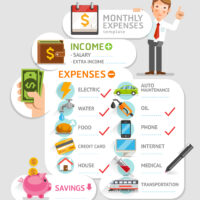Determining your Monthly Payments under Chapter 13

There are many reasons you might file for bankruptcy under Chapter 13 rather than Chapter 7, even though you might pay less by filing under Chapter 7. Chapter 13, known as the restructuring bankruptcy, consolidates your debts into a single monthly payment that you will make for a number of years—not fewer than three, but not more than five. Chapter 13 bankruptcies, when completed successfully, won’t have as long-lasting of a negative impact on your credit as will Chapter 7 bankruptcy. Generally, Chapter 13 petitioners can also retain their property through bankruptcy.
The bankruptcy court calculates your monthly payment using a number of factors. The factor that has the largest impact on your payment plan is your income. You will need to complete the bankruptcy court’s means test, as well as its disposable income test. Broadly speaking, the determining factor is whether your income falls above or below the median income for a New York household of the same size, with adjustments made for the region of the state in which you live. If your income is below average, you will pay a smaller percentage toward your unsecured debts, such as medical and credit card debt. If you have a greater-than-average household income, and disposable income left over each month after paying your necessary expenses, then that disposable income will be required to go toward your debts.
Additionally, the court will look at the property you own when determining your payment obligation. If you own property that would not have been exempt had you filed under Chapter 7, then you must include the value of that property in the amount you’re obligated to pay toward your debts. In this way, the court ensures that those filing under Chapter 13 do not pay less towards unsecured debts than they would had they filed under Chapter 7, where they might have been obligated to sell non-exempt property to satisfy creditors.
Unlike unsecured debts, some debts will always be included in full in a Chapter 13 payment plan, regardless of your income level. For example, so-called “priority debts,” including spousal or child support payments and certain tax debts, will need to be paid off in full through a Chapter 13 plan. Additionally, if you wish to keep your home but are behind on your mortgage payments, the amount by which you are in arrears on your mortgage will be included in your payment plan. Other secured debts (i.e., car payments) will also need to be included, if you want to keep that property.
If you wish to speak with an experienced attorney about your options to handle mounting debts, contact our Hudson Valley bankruptcy lawyers at Rusk, Wadlin, Heppner & Martuscello to discuss whether filing for a Chapter 7 or Chapter 13 bankruptcy might be a good fit for you. Call 845-331-4100 in Kingston or 845-236-4411 for our office in Marlboro.
